We are very pleased to have established a formal partnership between the University of Queensland and The Nature Conservancy.
UQ is a leading global centre of conservation research, with expertise particularly in the Asia Pacific region and a world renowned conservation research centre (Centre for Biodiversity and Conservation Science). TNC, as a leading global conservation organisation with work in over 70 countries, represents an important impact pathway for UQ research. UQ and TNC have a strong history of working together tackle pressing environmental issues.
This partnership aims to facilitate the connection between TNC in the Asia Pacific and staff and students at UQ, who, jointly, have the ideas and expertise for impactful, solutions-focused research. Through TNC and its network, UQ is able to feed its cutting-edge research directly into conservation practice and policy. Similarly, TNC’s experience, knowledge and information from on-the-ground implementation of policy and practice is able to feed into UQ’s research and teaching.
This website is a portal to TNC’s science staff in the Asia Pacific region and their areas of focus. It is intended to help UQ staff and students identify potential collaborators within TNC.
Resources
To support and catalyse further collaborations between TNC and UQ, TNC has made some resources available to UQ staff and students working on projects together with TNC. These will take the form of small grants but are not limited in what they can be applied to (e.g. field work, meetings, travel, equipment, publications, stipends), provided they are linked to TNC-UQ collaborations. If interested in drawing on these resources, please contact TNC Lead Scientist, Eddie Game (egame@tnc.org), or Professor James Watson, Director of the Centre for Biodiversity and Conservation Science (james.watson@uq.edu.au).
Within the Asia Pacific region, TNC has in-country staff and significant conservation investments in the following geographies:
- Mongolia
- China
- Hong Kong
- Federated States of Micronesia
- Palau
- Republic of Marshall Islands
- Indonesia
- Myanmar
- India
- Papua New Guinea
- Solomon Islands
- Australia
- New Zealand.
Work in these geographies represents the primary focus of the TNC-UQ partnership. Additionally, there is a shared interest in work that looks beyond national boundaries or more broadly at the region as a whole.
Listed alphabetically
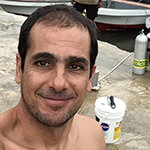 Javier Cuetos-Bueno, Micronesia
Javier Cuetos-Bueno, Micronesia
Javier is the fisheries advisor for TNC’s Micronesia program and leads TNC’s regional fisheries strategy across Micronesia. Javier’s expertise and research includes, (i) estimations of historical trends in fisheries landings, (ii) modeling fishing impacts on fish assemblages and their ecosystem functionality, (iii) assessing the impacts of regional/global socioeconomic factors on small-scale fisheries, and (iv) development of electronic fisheries monitoring tools. Drawing for his multidisciplinary background, Javier approach these themes from a combined ecological/socioeconomic perspective, providing for scientifically-sound, defendable, and tangible stakeholder-driven solutions to current conservation issues. Prior to joining TNC, Javier was an Associated Researcher at the University of Guam. Email: j[dot]cuetos-bueno[at]tnc[dot]org
 Dr James Fitzsimons, Australia
Dr James Fitzsimons, Australia
James is the Director of Conservation for The Nature Conservancy’s Australia program where he oversees the organization’s conservation planning, science implementation and policy functions for that country. This includes major conservation programs in the vast tropical savannas of northern Australia, the diverse central deserts, temperate estuaries of southern Australia, the wetlands and floodplains of the Murray-Darling Basin, and urban landscapes. His particular research interests are in the fields of protected area policy, practical conservation planning and mechanisms to integrate conservation outcomes on public and private lands. He has worked in the fields of conservation policy and planning for government environment departments and agencies, and for nongovernment environment organisations. Email: jfitzsimons[at]tnc[dot]org
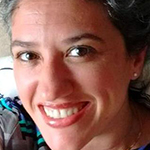 Dr Chiara Franco, Micronesia
Dr Chiara Franco, Micronesia
Chiara is a climate change specialist with TNC’s Micronesia program. She is responsible for linking ecological and economic strategies and data around climate change adaptation in Micronesia, and providing support to state agencies in drafting policies/strategies that includes nature-based climate change adaptation solutions. She received her PhD from the University of Essex in resource economics and her master’s in coral reef restoration. Email: chiara[dot]franco[at]tnc[dot]org
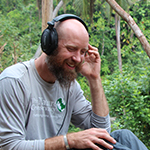 Dr Eddie Game, Asia Pacific
Dr Eddie Game, Asia Pacific
Eddie is TNC’s Lead Scientist for Asia Pacific region, and responsible for ensuring that the Conservancy remains a world leader in making science-based conservation decisions. Eddie has had the privilege of working on conservation in over 20 countries, helping to apply innovative methods to projects as diverse as community protected areas in Melanesia, grazing management in northern Kenya, snow leopard conservation in Mongolia, forestry in Indonesia, and catchment restoration in Colombia. He has published widely on aspects of conservation science and climate change, including the book, Conservation Planning: Informed Decisions for a Healthier Planet, co-authored with Craig Groves. Eddie is currently Editor-in-Chief of the leading conservation journal Conservation Letters. Eddie received his PhD in marine conservation and decision science from the University of Queensland. Email: egame[at]tnc[dot]org
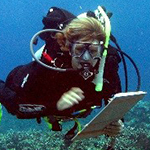 Dr Alison Green, Asia Pacific
Dr Alison Green, Asia Pacific
Alison is a global expert in designing networks of marine managed areas to enhance fisheries, protect biodiversity, and adapt to climate change. She also has expertise in coral reef fish ecology, assessment and monitoring. Alison is a senior marine scientist with The Nature Conservancy, who has provided scientific advice and training to field practitioners for conservation and management in over 20 countries worldwide (in Southeast Asia, the Pacific Islands, West Indian Ocean, Latin America and the Caribbean). Prior to joining TNC, she was Director of Science, Technology and Information at the Great Barrier Reef Marine Park Authority in Australia. Email: agree[at]tnc[dot]org
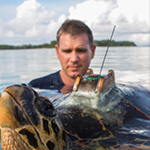 Dr. Richard Hamilton, Melanesia
Dr. Richard Hamilton, Melanesia
Richard is the Director of TNC’s Melanesia program. He has worked in Papua New Guinea and Solomon Islands for over twenty years and has a background in anthropology and marine science. His current research interests include assessing the impacts of land-based threats on coral reefs and investigating fish and turtle connectivity patterns.
 Dr Muhammad Ilamn, Indonesia
Dr Muhammad Ilamn, Indonesia
Ilman is the Director of the Oceans Program for TNC’s Indonesia program. Ilman leads the sustainable coastal and marine resources management initiatives at TNC Indonesia. Prior to TNC, he worked with several development organizations for wetlands and marine conservation including with United Nations Development Program of Timor-Leste and Wetlands International Indonesia. He also has extensive experience of working with commercial seafood industries. He obtained his PhD in environmental management from the University of Queensland and has conducted research about carbon finance, mangroves, and sustainable aquaculture. Email: muhammad[dot]ilman[at]tnc[dot]org
 Robyn James, Melanesia
Robyn James, Melanesia
Robyn is the Director of Conservation for TNC’s Melanesia program. She also leads work on women’s empowerment in work across the organisation.
She currently leads gender, climate change and mining strategies for the TNC Melanesia program and has worked with Solomon Islands Government to develop minerals policy as well as ensuring women in the most remote communities are better involved in natural resource decisions, especially under a changing climate. She has led climate change projects across the Pacific and worked with communities and governments to develop strategies to cope with a changing climate. She is currently undertaking a PhD on gender and natural resource management at the University of Queensland. She has previously worked for both the University of Queensland and Queensland Government on state and global projects on resource planning, conservation and protected areas. She is a member of the IUCN World Commission on Protected Areas and the UQ Sustainable Minerals Institute Environment Centres Advisory Board. Email: rjames[at]tnc[dot]org
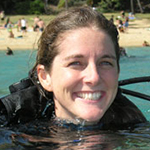 Dr Lizzie McLeod, Asia Pacific
Dr Lizzie McLeod, Asia Pacific
Lizzie is a Climate Adaptation Scientist for TNC’s Asia Pacific region and the science lead for the Reef Resilience Network which provides the latest scientific guidance and resources to help coral reef managers globally to address the impacts of climate change and local threats. Lizzie’s research focuses on building the resilience of coastal communities and ecosystems to climate change. She has worked on conservation projects across Micronesia, Indonesia, and Melanesia, modeling the impacts of climate change, conducting reef assessments, developing research priorities and management recommendations for climate change, blue carbon, ocean acidification, and developing and applying frameworks to assess community vulnerability to climate change and adaptation options. Lizzie received her PhD in climate vulnerability and adaptation in tropical systems from the University of Hawaii, and serves as an editor for the journals Frontiers in Ecology and the Environment and Coastal Management. Email: emcleod[at]tnc[dot]org
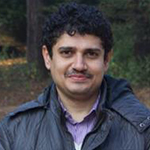 Dhaval Negandhi, India
Dhaval Negandhi, India
Dhaval is an Ecological Economist with The Nature Conservancy’s India program and supports all program teams in conducting economic analyses for conservation projects. He currently manages the projects on Renewable Energy and Reforestation by Design and Restoring River Narmada in the Central Indian Landscape. An alumnus of the Indian Institute of Forest Management, Dhaval also worked with the Institute on issues related to ecosystem services, conservation finance and natural capital at the science-policy interface. He has been an integral part of research studies that have influenced national policies in India on forest and wildlife management including the Net Present Value of Forest Diversion in India, Forest Fiscal Federalism for the 14th Finance Commission of India and Economic Valuation of Tiger Reserves in India. He has a Master’s in Forestry Management from India and another Master’s in Environmental Science, Policy and Management from three universities across Europe. He is based out of Bhopal in Madhya Pradesh. Email: dhaval[dot]negandhi[at]tnc[dot]org
 Professor Hugh Possingham, Global
Professor Hugh Possingham, Global
Hugh is TNC’s Chief Scientist. He guides and promotes the work of TNCs >350 practicing scientists working in 72 countries and every state of the US. He works to assist all aspects of science across the Conservancy with the primary purpose of ensuring that The Nature Conservancy is a science-based organization. His expertise is in ecology, applied mathematics, spatial planning, operations research and economic instruments for conservation outcomes, and he has coauthored >650 refereed publications. Hugh is also Professor of Ecology and Mathematics at the University of Queensland. Email: hugh[dot]possingham[at]tnc[dot]org
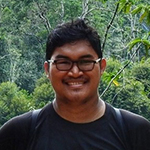 Mohamad Arif Rifqi, Indonesia
Mohamad Arif Rifqi, Indonesia
Arif is an primatologist with TNC’s Indonesia program. He is responsible for TNC’s Orangutan program and Wehea-Kelay Essential Ecosystem Area Management which includes biological surveys and integrating the results of these into ecosystem management. Arif has had much experience working on orangutan conservation. Prior to TNC he worked for the Indonesian Orangutan Forum (FORINA). He is an accomplished photographer and has a degree from the Indonesia National University in Jakarta. Email: mohamad[dot]rifqi[at]tnc[dot]org
 Dr Ruslandi, Indonesia
Dr Ruslandi, Indonesia
Ruslandi is the Production Forestry Senior Manager, for TNC’s Indonesia program. He is responsible for science that supports timber concessions in improving their practices, including, testing and refining RIL-C methodology to measure carbon emission reductions from improved impact logging practices, developing tools and methods to strengthen the capacity of Forest Management Units (KPHs), developing toolkits to be used by Ministry of Forestry Training Center. Ruslandi obtained his Masters degree in forestry from University of Oxford in 2002 and his PhD degree from University of Florida in 2016 on silviculture intensification in natural forests in Indonesia. Ruslandi has over two decades of experience working on forest management, forest certification, forest dynamics, and forest inventory issues with groups such as UNREDD Indonesia and CIFOR. Email: ruslandi[at]tnc[dot]org
 Dr Sushil Saigal, India
Dr Sushil Saigal, India
Sushil is an Applied Land Scientist with TNC’s India program. Sushil oversees the India program’s portfolio of land conservation projects and led the development of the organisation’s strategies for climate change mitigation through natural climate solutions, and its work in the Central Indian Highlands. He has over 25 years of experience working on issues related to climate change, conservation and natural resources management. Prior to joining TNC, he worked with the USAID Partnership for Land Use Science (Forest-PLUS) Program, Winrock International India, International Institute for Environment and Development, and Society for Promotion of Wastelands Development. Sushil has authored/edited five books and several papers on forestry, conservation, and climate change issues. Sushil has completed three Master’s degrees: MBA (IIFM), MSc Forestry at the University of Oxford, U.K., and an MPhil in Environment & Development at the University of Cambridge, U.K. He was a Gates & ORS Scholar at Cambridge and holds a Ph.D in Political Ecology from the Department of Geography, University of Cambridge. Email: sushil[dot]saigal[at]tnc[dot]org
 Musnanda Satar, Indonesia
Musnanda Satar, Indonesia
Musnanda is the Natural Resource Planning Manager for TNC’s Indonesia Program. He supports spatial analysis around sustainable development planning initiatives. He has expertise in the development of web-based tools to support better decision making in land based sectors. Prior to joining TNC, he worked for USAID and UNDP on projects including low emission development strategies and disaster risk reduction of tsunamis and earthquakes in Aceh. He holds a master’s degree in Urban and Regional Planning from the Bandung Institute of Technology, Indonesia. Email: musnanda[at]tnc[dot]org
 Liz Terk, Micronesia
Liz Terk, Micronesia
Liz is the Director of Conservation Science and Planning for TNC’s Micronesia program. She has worked on conservation in Micronesia for over 10 years, first as the Deputy Director of the Conservation Society of Pohnpei and then as the Conservation Program Manager from the Micronesia Conservation Trust. She holds a Master of Advanced Studies in Marine Biodiversity and Conservation from the Scripps Institute of Oceanography and Bachler’s degree in Biology from Occidental College. Her main areas of work include marine spatial planning, designing Marine Protected Areas to achieve fisheries management objectives, conservation action planning and community-based climate change adaptation. Email: Email: eterk[at]tnc[dot]org
 Dr Jin Tong, China
Dr Jin Tong, China
Jin is the Director of Science for TNC’s China program, where she is responsible for leading a team to fulfil the responsibility of scientific research, application, innovation and communications to demonstrate the “science-based approach” of TNC. Her expertise lies in protected area planning, management and monitoring, with special focus on the land trust reserve model in China. Additionally, she is experienced in wildlife ecology and primatology, as well as community-based conservation methodologies. Jin holds a Ph.D. in Animal Ecology and Conservation Biology from Peking University, studying the socio-ecology and conservation biology of a critically endangered primate species in China. She serves as the China franchise of Conservation Coaches Network (CCNet) and is a board member of the China Primatology Society. Email: jtong[at]tnc[dot]org
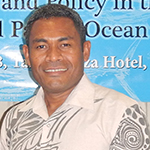 Elliot Tovaboda, Papua New Guinea
Elliot Tovaboda, Papua New Guinea
Elliot is a Fisheries Scientist for TNC’s Papua New Guinea program. His current research interests include spatial ecology of fish and invertebrates and community-based management of inshore artisanal fisheries. Email: elliot[dot]tovaboda[at]tnc[dot]org
 Simon Vuto, Solomon Islands
Simon Vuto, Solomon Islands
Simon is TNC’s marine scientist for the Solomon Islands. He has a BSc, Postgraduate diploma and MSc in Marine Science from the University of South Pacific. Simon is responsible for providing technical leadership and scientific support to communities, local NGOS and provincial and national government staff whom the conservancy partners with in Solomon Islands. Simons research interests are broad and include turtle conservation, coastal fisheries research and assessing the impacts of climate change on food security. He is leading a project to quantify the level of legal and illegal turtle harvest across Solomon Islands. Email: simon[dot]vuto[at]tnc[dot]org
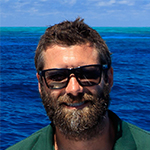 Dr. Peter Waldie, Melanesia
Dr. Peter Waldie, Melanesia
Peter is a Fisheries Scientist for TNC’s Melanesia program. He works in Papua New Guinea and the Solomon Islands, focusing on community-based fisheries management, using market-based instruments for sustainable livelihoods, and fish and invertebrate spatial ecology. He has a PhD from James Cook University. Email: peter[dot]waldie[at]tnc[dot]org
 Dr Bayar Yunden, Mongolia
Dr Bayar Yunden, Mongolia
Bayarjargal (Bayar) is the Director of Science for TNC’s Mongolia program, and provides technical and scientific support and leadership for conservation initiatives as well as being responsible for implementing landscape level spatial analyses and ecosystem service work in Mongolia. He has an Engineer of Meteorology degree from the National University of Mongolia. Bayar has his PhD in Geography and Masters of Environmental Sciences in Desert Studies from the Ben Gurion University of the Negev, Israel. Previously, he served as a Coordinator for Mongolian Biodiversity Conservation Project’s Small Projects Fund in 1996-1999, and he was a member of team that prepared the First National Biodiversity Report. From 1992 to 1996, he served as scientist at the National Remote Sensing Center, Ministry for Nature and Environment of Mongolia. Email: byunden[at]tnc[dot]org

